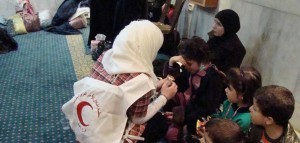Violence in Syria Sparks Reproductive Health Crisis

By Mariam Abdullah
It was a rare moment of joy for one displaced family, as they celebrated their son’s wedding at one of the refugee shelters, amidst the sounds of shelling and gunfire. But not everyone was enjoying themselves; Um Mustafa, 26, the second wife of the groom’s father was not feeling well, and she complained to one of the shelter volunteers.

Later I learned she was pregnant with her third child, but her condition was precarious, having not fully recovered from the birth of her last child, in addition to the constant fear of war and the family’s flight from their home. Um Mustafa and her baby were in danger.
Um Mustafa is just one of the many Syrian women whose reproductive health has suffered due to incredible stress and inadequate living conditions. Syria suffered from a weak health system even before the war, a situation which was first exacerbated by a general lack of awareness, inadequate laws, and now armed conflict. The few health centres that did exist are now gone or difficult to access, at a time when women are suffering from the mental and physical wounds of war.
I recently visited a number of health centres set up under the auspices of the International Medical Corps and supervised by Syrian Family Planning Association, which offers steeply discounted treatment, and where many displaced women seek services.
Doctors who spoke to me said they see women for everything from depression to contraception, and have even encountered several cases of botched abortions, which can lead to the death of the mother, the foetus or both, or birth defects in the case of a failed abortion. An increase in unwanted pregnancies and home abortions is just one of the catastrophic results of the war, which is thought to have had a disastrous effect on maternal mortality, although no such data exists.
This deterioration in women’s reproductive health follows a period of improvement leading up to the war, as indicated by the United Nations report Trends in Maternal Mortality: 1990 – 2010, issued in 2012. According to this report, Syria succeeded in reducing maternal mortality rate by 70 percent, bringing the number of maternal deaths per 100,000 live births from 240 cases in 1990 to 70 cases in 2010. In so doing, Syria came a long way towards achieving the goal set by the UN Millennium Development Goals program, which aims to reduce infant mortality by 75 percent worldwide. Syria’s results compared favourably to the average achieved by the countries of West Asia, which lowered the maternal mortality rate by just 57 percent over the same period, according to the report. However, there are no figures on maternal mortality since the crisis in Syria began in 2011, although there is a high probability that any progress was reversed due to the armed conflict.
In addition to the immediate need to provide medical assistance to displaced Syrian women and those living in the areas affected by fighting, there is also need to develop a long-term action plan aimed at improving the reproductive health of women after the fighting stops.
First, the number of health centres that provide free medical services for pregnant women should be increased, along with the capacities of existing centres, especially in rural areas. A survey by the United Nations Fund for Population in 2011 of health centres in the provinces of Raqqa and Hassaka and Deir El-Zor found that only 20 percent provide services to pregnant women.
There is a need to raise awareness of reproductive health through the education system and media, as well as in the health centres themselves. Improving women’s health rests largely on healthy habits, according to the 2011 Family Health Survey undertaken by the Central Bureau of Statistics. The survey showed that the percentage of pregnant women between the ages of 15 and 19 years increased between 2001 and 2009 by 0.9 percent. The report also drew a link between teen pregnancies and poor health of both mothers and children.
Future governments must also apply the United Nations Convention to Eliminate Discrimination Against Women (CEDAW), which was ratified by Syria. Special attention should be given to Article 12 regarding health care and family planning.
Syria should also pass the ‘safe motherhood’ law, which has been championed by civil society organizations in many Arab countries. This law includes provisions aimed at reducing maternal mortality, as well as alleviating health problems that may occur during pregnancy, childbirth and after. This law should also aim to reduce the number of abortions and premature births, by emphasizing prenatal health care and services for new mothers. This law should ensure the health and safety of women and children as stipulated by international conventions signed by Syria which affirm health care as a fundamental right.
